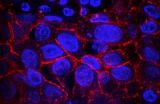(Press-News.org) People with AIDS are at increased risk for developing esophageal and stomach carcinoma as well as non-Hodgkin lymphomas (NHLs), according to a new study in Gastroenterology, the official journal of the American Gastroenterological Association.
"People diagnosed with AIDS are living longer due to improved therapies. However, they remain at increased risk of developing a number of different cancers," said E. Christina Persson, PhD, of the National Cancer Institute and lead author of this study. "An elevated risk of esophageal and stomach cancers had been observed before, but we were able to look at risk for subtypes of these malignancies."
In this study, researchers analyzed data from the HIV/AIDS Cancer Match Study, which links data collected from 1980 to 2007 for 16 U.S. population-based HIV and AIDS and cancer registries. They compared risks of stomach and esophageal cancers in 596,955 people with AIDS with those of the general population.
Those with AIDS had a 69 percent and 44 percent increased risk of esophageal and stomach carcinomas, respectively. The risks of NHLs — tumors of immune cells — in the stomach and esophagus were also strongly elevated. Additionally, the researchers' analysis showed a significant 53 percent increased risk of cancer of the lower stomach in people with AIDS. Since Helicobacter pylori infection is one of the causes of this type of stomach cancer, one explanation for an increased risk of this cancer might be an increased prevalence of H. pylori in people with AIDS.
Another explanation for this elevated cancer risk could be more frequent use of tobacco and alcohol among people with AIDS. Programs encouraging tobacco cessation and alcohol moderation may help reduce the occurrence of esophageal and stomach carcinomas among these patients.
### About the AGA Institute
The American Gastroenterological Association is the trusted voice of the GI community. Founded in 1897, the AGA has grown to include 17,000 members from around the globe who are involved in all aspects of the science, practice and advancement of gastroenterology. The AGA Institute administers the practice, research and educational programs of the organization. www.gastro.org.
About Gastroenterology
Gastroenterology, the official journal of the AGA Institute, is the most prominent scientific journal in the specialty and is in the top 1 percent of indexed medical journals internationally. The journal publishes clinical and basic science studies of all aspects of the digestive system, including the liver and pancreas, as well as nutrition. The journal is abstracted and indexed in Biological Abstracts, Current Awareness in Biological Sciences, Chemical Abstracts, Current Contents, Excerpta Medica, Index Medicus, Nutrition Abstracts and Science Citation Index. For more information, visit www.gastrojournal.org.
Like AGA, Gastroenterology and Clinical Gastroenterology and Hepatology on Facebook.
Join AGA on LinkedIn.
Follow us on Twitter @AmerGastroAssn.
Check out our videos on YouTube.
AIDS patients face risk for esophageal, stomach cancers
2012-09-24
ELSE PRESS RELEASES FROM THIS DATE:
Managing soil copper in crops irrigated with cattle footbath wastewater
2012-09-24
This press release is available in Spanish.
Getting a head start on stopping soil copper buildup will now be a bit easier, thanks to studies by U.S. Department of Agriculture (USDA) scientists. This research could help Pacific Northwest farmers develop long-term irrigation management strategies to protect crops from potentially dangerous soil copper levels.
Scientists with USDA's Agricultural Research Service (ARS) conducted a laboratory investigation to assess how copper levels in wastewater used for irrigation affected crop performance and soil microbial activities. ...
UNC Lineberger scientists lead cancer genome analysis of breast cancer
2012-09-24
A team of scientists with The Cancer Genome Atlas program reports their genetic characterization of 800 breast tumors, including finding some of the genetic causes of the most common forms of breast cancer, providing clues for new therapeutic targets, and identifying a molecular similarity between one sub-type of breast cancer and ovarian cancer.
Their findings, which offer a more comprehensive understanding of the mechanisms behind each sub-type of breast cancer, are reported in the September 23, 2012 online edition of the journal Nature.
The researchers, including ...
Stratosphere targets deep sea to shape climate
2012-09-24
SALT LAKE CITY, Sept. 23, 2012 – A University of Utah study suggests something amazing: Periodic changes in winds 15 to 30 miles high in the stratosphere influence the seas by striking a vulnerable "Achilles heel" in the North Atlantic and changing mile-deep ocean circulation patterns, which in turn affect Earth's climate.
"We found evidence that what happens in the stratosphere matters for the ocean circulation and therefore for climate," says Thomas Reichler, senior author of the study published online Sunday, Sept. 23 in the journal Nature Geoscience.
Scientists ...
Constraining world trade is unlikely to help the climate
2012-09-24
Instead, researchers were able to pin down a number of factors explaining the pronounced imbalances between emission importers and exporters, the US current account deficit being one of them. Their conclusion: interventions in world trade, like CO2 tariffs, would probably have only a small impact on global emissions.
Steadily growing world trade leads – as earlier research has shown – to a substantial transfer of CO2 from one country to another. The traded goods effectively contain the greenhouse gas, as it originates from the energy used during their production. "Typically, ...
Study reveals genomic similarities between breast cancer and ovarian cancers
2012-09-24
One subtype of breast cancer shares many genetic features with high-grade serous ovarian cancer, a cancer that is very difficult to treat, according to researchers supported by the National Institutes of Health. The findings suggest that the two cancers are of similar molecular origin, which may facilitate the comparison of therapeutic data for subtypes of breast and ovarian cancers.
The researchers, using data generated as part of The Cancer Genome Atlas (TCGA), described new insights into the four standard molecular subtypes based on a comprehensive characterization ...
Mayo researchers develop editing toolkit for customizing zebrafish genomes
2012-09-24
ROCHESTER, Minn. -- Mayo Clinic researchers and an international team of scientists have developed a highly-efficient means of editing zebrafish genomes for research purposes, eliminating a bottleneck that has stymied biomedical scientists from using the fish as a model for human disease. The details appear online today in the journal Nature.
For many researchers, zebrafish are becoming the model of choice for genetic studies. However, the inability to efficiently target genetic modifications has delayed their use by some. The Mayo team used an improved variant of artificial ...
UN, other experts warn of 'water bankruptcy' for many regions after reviewing 200 major global projects
2012-09-24
Bangkok, 24 September 2012 - A study of almost 200 major international water-related projects over the past 20 years has identified a suite of existing and emerging challenges and how science can offer remedies.
The Global Environment Facility (GEF), the largest public funder of projects to improve the global environment and promote sustainable development, partnered with the United Nations University and the United Nations Environment Programme (UNEP) to extract lessons from a portfolio of major transboundary water projects involving investments of more than US$7 billion.
Insufficient ...
Cancer research yields unexpected new way to produce nylon
2012-09-24
DURHAM, N.C. – In their quest for a cancer cure, researchers at the Duke Cancer Institute made a serendipitous discovery -- a molecule necessary for cheaper and greener ways to produce nylon.
The finding, described in the Sept. 23, 2012, issue of the journal Nature Chemical Biology, arose from an intriguing notion that some of the genetic and chemical changes in cancer tumors might be harnessed for beneficial uses.
"In our lab, we study genetic changes that cause healthy tissues to go bad and grow into tumors. The goal of this research is to understand how the tumors ...
MDC researchers solve puzzle of B-cell lymphoma development
2012-09-24
Germinal centers are sites in the organs of the lymphatic system, formed during the course of an immune response to infection, where B cells intensely proliferate and modify their DNA in order to produce antibodies specific for the pathogen. However, it is known that the vast majority of lymphomas derive from the B cells at the germinal centers. Now, Dr. Dinis Pedro Calado and Dr. Klaus Rajewsky of the Max Delbrück Center for Molecular Medicine (MDC) Berlin-Buch have identified subgroups of B cells in germinal centers in which the proto-oncogene Myc, a critical regulator ...
Some deadly breast cancers share genetic features with ovarian tumors
2012-09-24
The most comprehensive analysis yet of breast cancer shows that one of the most deadly subtypes is genetically more similar to ovarian tumors than to other breast cancers.
The findings, published online Sept. 23 in Nature, suggest that most basal-like breast tumors and ovarian tumors have similar genetic origins and potentially could be treated with the same drugs, says the study's co-leader Matthew J. Ellis, MD, PhD, the Anheuser-Busch Chair in Medical Oncology at Washington University School of Medicine in St. Louis. The other co-leader is Charles M. Perou, PhD, at ...



